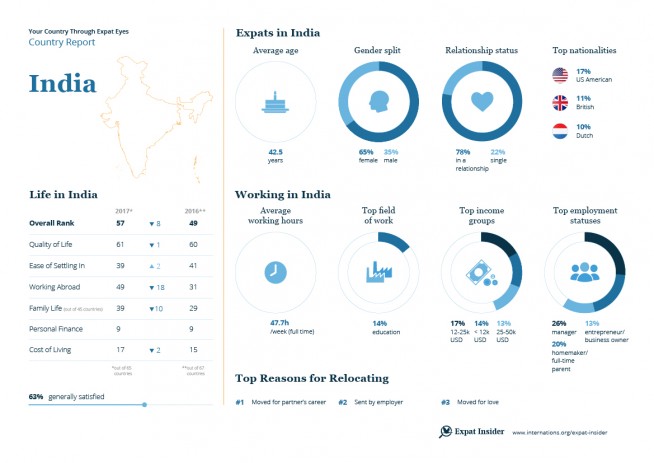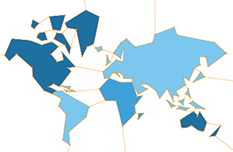India: Low-Cost Living with Security Struggles
- Poor performance in Family Life Index
- Long working hours with 47.7 hour full-time working week
- 9th place in Personal Finance Index
- In bottom 5 for quality of life
- Nearly 30% unhappy with personal safety
- Culture shock makes it challenging to settle in
Disappointing Family Life
After falling ten places, India ranks 39th out of 45 countries in the Family Life Index in 2017. This is largely because of the limited options for children’s education, which close to three in ten expat parents (29%) are unhappy with. Despite this, most (61%) still rate the quality of education favorably. The fact that 54% of expat parents in India send their kids to international schools possibly plays a role here and might also explain why over half (54%) believe that education is not easy to afford.
Troubles of a Trailing Spouse
The most popular reason among female respondents (31%) for moving to India is their partner’s job or education. Sadly, life is not always straightforward for women in India: over half (52%) say that there were instances where they felt unwelcome due to their gender.
It’s hard for a woman to work and progress in her chosen career.
Despite 47% of female expats having a postgraduate degree or PhD and another 37% with bachelor’s degrees, nearly a third (31%) stay at home to look after the household and/or their children. Not being able to use their education in a professional environment may be a reason why 16% of female respondents in India are generally unhappy with their life abroad. One Canadian expat claims that trailing spouses “can be left with a sense of a lack of purpose”. Limited childcare options may be another explanation for the large proportion of stay-at-home moms, with 47% of expat mothers in India stating that it is difficult to find childcare. One respondent from the Philippines confirms that the “difficulty of finding a helper to assist with child rearing and household chores” makes it hard for a woman “to work and progress in her chosen career”.
Poor Work Life
India has dropped 18 places in the Working Abroad Index, coming 49th out of 65 countries in 2017. The country performs particularly badly in the Work-Life Balance subcategory, ranking 58th. Over three in ten respondents in India (31%) are unhappy with this aspect — ten percentage points higher than the global average. This dissatisfaction is also echoed by India’s position in The Indeed Job Happiness Index 2016, where it ranks 27 out of 35 countries.
The poor work-life balance might perhaps be connected to the long working hours: expats working full-time spend 47.7 hours per week at their jobs in India — more than three hours longer than the global average of 44.3.
Low Cost of Living and Superb Salaries
With rent in India being 93% cheaper than in New York City, it’s no surprise that over two-thirds of expats (69%) are happy with the cost of living. High salaries also contribute towards satisfaction with personal finances; over a third of respondents in India (36%) have access to an annual household income of over 100,000 USD, compared to a global average of just 21%. This may be connected to the fact that over a quarter of respondents (26%) are managers and, of these, 70% work in top management. As a result, 86% claim that their disposable household income is enough or even more than enough to cover everything they need for their daily life.
Happy with Healthcare but Displeased with Pollution
India performs continuously poorly in the Quality of Life Index and ranks 61st out of 65 in 2017. The quality of healthcare is not an issue for expats, however, as 62% rate this aspect favorably. What’s more problematic is the quality of the environment; four Indian cities fell into the top ten most polluted cities in the world in a recent study, and expats have certainly picked up on this issue — 80% say they are dissatisfied with the quality of the environment. One US American expat states that the “pollution is extremely off-putting and has a very negative effect on health”.
Serious Security Problems
Before moving to India, over one-third of respondents (36%) believed that the move could have a negative impact on their personal safety. This did not change upon arrival, and nearly three in ten respondents (29%) continue to be unhappy with this aspect. This is echoed by the Safety & Security sub-index of the Legatum Prosperity Index, in which India ranks 135th out of 149.
Easy to Find Friends but a Struggle to Settle In
Expats in India are relatively content with their friendships, with over half (54%) stating that it is generally easy to make friends in the country. There also seems to be no problem breaking out of the expat bubble: 28% describe their social circles as being mainly local residents, nearly ten percentage points higher than the global average (19%).
I’ve made a lot of very good friends here. The cultural diversity is amazing.
This may be facilitated by the fact that English has become a quasi-official language in India, with over 86 million Indians speaking it as a second language. Two-thirds of expats (66%) therefore find it easy to live in the country without speaking Hindi or one of the different states’ official languages. Despite India’s linguistic advantages, expats still struggle to settle into life in the country, resulting in it ranking 58th out of 65 in the Feeling Welcome subcategory. One US expat, while paying tribute to “the culture shock that most expats experience when they come here”, draws an overall positive conclusion: “I’ve made a lot of very good friends here. The cultural diversity is amazing.”
Further Reading
- Indeed: The Indeed Job Happiness Index 2016: Ranking the World for Employee Satisfaction
- GoBankingRates: 50 Cheapest Countries to Live In
- The Guardian: Pant by numbers: the cities with the most dangerous air – listed
- Legatum Institute: The Legatum Prosperity Index™ 2016
- Times of India: Indiaspeak: English is our 2nd language
- Expat Insider 2016 — Welcome to India: Chaotic and Friendly
- Expats in India




